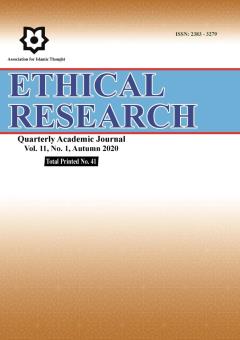An Introduction to the Relations of Government and Society in Contemporary Iran from the Ethics of Financial Sociology
Subject Areas : Ethics and Islamic EducationMahdi Esmaili 1 , Majid Tavassoli Rokn abadi 2 *
1 -
2 -
Keywords: Financial Sociology, Rentier Government, Contemporary Iran, Government.,
Abstract :
The present paper examines the theoretical analysis of the relationship between government and society. In contemporary Iranian history, the state has a different basis with European societies for its independent and extracurricular nature both in terms of its origin and in its nature and function. Given the socio-political developments of contemporary Iran, especially since the history of oil revenues, the Iranian state has evolved as a superior power over the classes in its particular evolution. In other words, the independence of the state was possible in the context of the competition of social forces and class balance but in the context of the weakness of classes and social groups. In these circumstances, various theories have been formed in examining the structure of government in Iran and its relation to society. Applying a financial sociology approach to examining the nature of government in Iran, not only will government-society relations be better elucidated, but attention to these findings will give reasons for Iran's underdevelopment not in the distant past but in economic, political and social realities. In examining the relationship between government and society as they form the state and social structures, it is important to examine the enduring patterns of the internal and external structure of government relations. This paper aims to argue that the theoretical framework of research suggests that a better financial sociology approach can explain the relationship between government and society in contemporary Iran.
Bashirieh H. (2010). Lessons of Democracy for All, Tehran, Contemporary Look Publication. 224 pp (In Persian)
Giuliano P. (1991). "Ethics, Politics, Revolution", Culture Monthly, Second Year; 1(2): 100-101
Evans Peter. (1994). (b) “Embedded Autonomy: state and Industrial Transformation " . Uncpress New York
Giddens A. (2005), Global Perspectives, Translated by Jalayepour, Mohammad Reza, Tehran, New Design Publishing. 164 pp (In Persian).
Rakabian R. (2018). Determining the Relationship between Government and Society in Imam Khomeini's Political Thought. Journal of transcendental politics; 6 (20): 80-63.
Bashirieh H. (2009). The Obstacles to Political Development in Iran, Tehran, New step Publishing. 176 pp. (In Persian)
Scotchpull, Theda (2003) "Rentier State and Shiite Islam in the Iranian Revolution". Translated by Mohammad Taghi Delfroz. Strategic Studies Quarterly; 1: 1-24.
Barbieh M. (2004). Political Modernity, Translate by Ahmadi, Abdul Wahhab, Tehran, Agah Publication.
Campbell D. & Dillon M. (eds), The Political Subject of Violence, Manchester, Manchester University Press, 1993,
Schumpeter JA. (1954). The crisis of the tax state. In international Economic Papers, eds AT. Peaceock, W. Stolper, R. Turvey, E. Henderson. Newyork: Macmillan
Goldscheid, R. (1958). A Sociological approach to problems of public finance Goldstone, Jack, (1991), Revolution and Rebellion in the Early Modern World, (Berkeley, California: University of California Press, 1991. xxix plus.
Mann F. K. (1943). The sociology of taxation. Review political .
Block F. (1981). The fiscal crisis of the capitalist state . Annu. Rev. Sociol.
Swedberg R. (1991). Introduction: The man and his work. In joseph A. Schumpeter : The Economic and Sociology of capitalism, ed, R. Swedberg: Princeton Univ Press.
Tabibian M. (1992) "Economic Rent as an Economic Barrier" Journal of Planning and Budgeting; 4: 1-40. (In Persian)
Halliday F. (1982), THE IRANIAN REVOLUTION, JO - Political Studies, Blackwell Publishing Ltd
Sodagr MR. (2000). The growth of capitalist relations in Iran. Frzin Publication, 864 pp (In Persian)
Issawi, Charles(1966) the economic history of the middle east, 1800- 1914:Chicago: university of Chicago
Katoozian MA. (1988). Iranian Political Economy. Tehran. Papyrus Publication.
Manouchehri Rad R. & Shams Qarane N. (2013). The Dutch Disease in Iranian Economy, Tehran: The World of Economics.
Khosh Akhlagh R & Mousavi Mohseni R. (2006). "Oil Shocks and the Dutch Disease Phenomenon in the Iranian Economy: A Computational Model of General Equilibrium". Economic Research 77.
Brocker P. (2018). Non-democratic regimes (theories, politics and government). Translate by Samiei Esfahani, AR. Kavir Publishing,
Karran T. (1985). The Determinants of Taxation in Britain: An Empirical Test. Journal of Public Policy; 5(3): 365-386.

